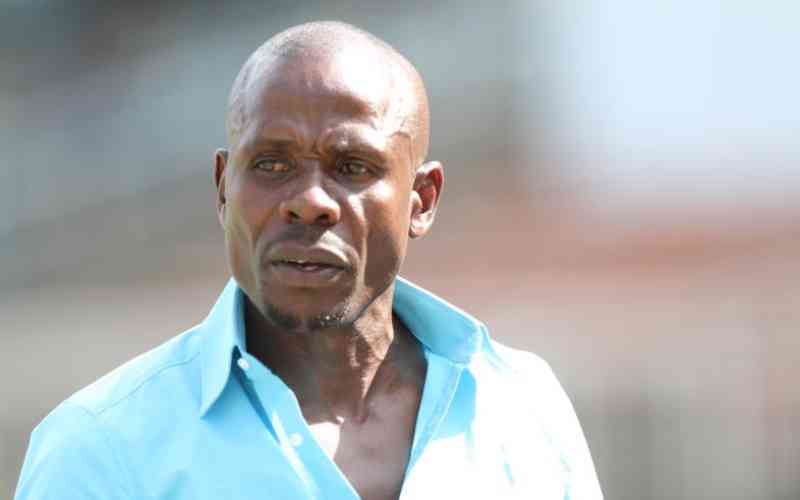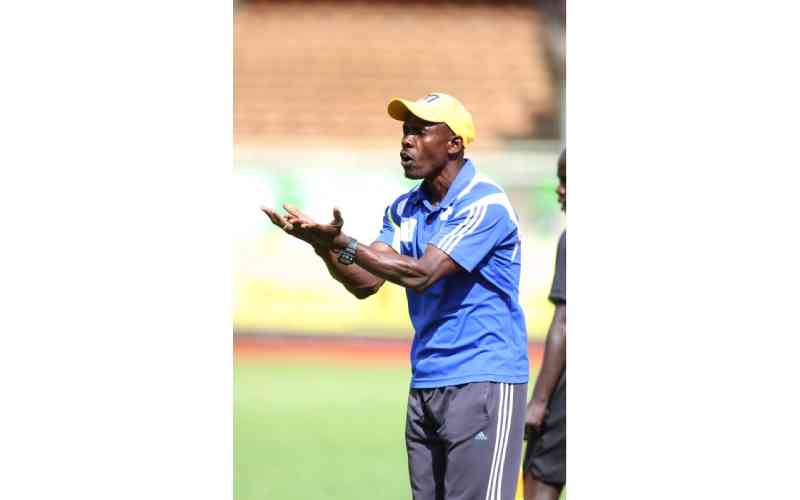
Feisal FC, Ulinzi Stars, and Oserian Fastac FC are three of the four sides based outside Nairobi that have won the Kenya Premier League. Ulinzi began in Thika before moving to Nakuru but have since moved to their new base in Lang'ata. Sony Sugar FC is the first club from football-mad Western Kenya to have won the KPL in 2006. Thirty-two-year-old Francis Baraza successfully transitioned from player-coach to full coach to lead the Awendo-based club to their first league title.
This happened during the “lost decade” of Kenyan football between 2000 and 2009 when Gor Mahia and AFC Leopards’ fortunes dwindled. That era saw Mathare United and Sofapaka also winning their only league titles so far, in 2008 and 2009 respectively. It was also an era of coups, disputes, and confusion in Kenyan football.
Francis Baraza was a no-nonsense centre-back who wore dreadlocks in his playing days. I bumped into the 50-year-old, with the physique of a gym instructor in his early 30s, at MoW Sports Club last weekend. He had just come back to Nairobi after watching the secondary school nationals games in Kisii last week. Until last season, he was the coach of Dodoma Mjini FC in Tanzania. This was his third club in Tanzania after guiding Biashara United and Kagera Sugar FC in the Tanzanian top-flight league.
Baraza was born in Mombasa in 1974 to a father from Samia in Busia who worked at the Kenya Ports Authority. His elder brother, Patrick Ouma, also played football for Transcom FC in Nakuru and Gor Mahia FC. He attended St. Charles Lwanga and Tudor Primary schools before joining Mombasa High School in 1989. Mombasa was then under the tutelage of Peter Mayoyo, currently based in Kitale with St. Antony’s High School.
In 1992, he was part of the squad that dethroned Khamis High School as Coast Province football champions with a five-goal-to-nil drubbing. They went on to win their maiden national title against the Musa Otieno-led Ofafa Jericho High School in Mombasa. The following year, he followed his brother to Nakuru at the Ministry of Transport side, Transcom FC. When Transcom was disbanded, Abdul Majid had taken note of his talent and invited him to the Eldoret-based Rivatex FC in 1994.
He was in Eldoret for two seasons, and in 1996, AFC Leopards’ chairman Peter Onalo came calling with an offer he couldn’t resist. He left with Fred Ambani for the den where Jack Johnson was the coach. Onalo was assembling a strong side, and Mathew Ottamax joined from Gor Mahia, with Boniface Ambani soon following his elder brother to the den.
Jack Johnson left, and Sierra Leonean Abu Koroma took over before Flemming Jacobsen assumed the role. Jacobsen was in charge of Shabana in 1997 when the Kisii-based side, with schoolboys like Simeon Mulama, denied Ingwe the league title on the last day. Abu Koroma won the CECAFA title against Kenya Breweries FC in Nairobi to console Ingwe fans. However, it was not enough to convince the club to retain him as coach. Jacobsen would guide Ingwe to a good run in the first leg of 1998 before leaving as well. Tanzanian Sunday Kayuni joined and guided them to their last league title to date.
Baraza was at the core of that defence with Paul Ochieng’, with Francis Oduor and Eric Mwabi as fullbacks. Koroma had brought James Kayimba with him from Ports FC of Freetown as a fullback but converted him into a lethal winger. Tony Lwanga was at the centre of their midfield as the Ambani brothers led the attack. Baraza was also good at converting corners with his powerful runs into the box when needed. Goalkeepers feared his free kicks, which he took with a hard shot. His student, Noah Abich, inherited the hard-shot free kicks from him. That title with Leopards marked the end of Gor Mahia and Leopards’ dominance and the beginning of their struggles, as well as the “lost decade” of Kenyan football.
An injury in the last days of the 1998 season kept him out of the first leg of the 1999 league. When he could play, he joined Shabana FC for the second leg. At Shabana, he scored ten goals and helped the side finish second in the league after Mumias Sugar FC was disqualified for match-fixing. The following season, Oserian Fastac FC of Naivasha was promoted to the league and went on a recruitment spree. Baraza left Kisii for Naivasha to join Boniface Ambani, Fred Ambani, John Baraza, Tom Juma, and Sammy Simiyu.

Oserian finished third in their division in 2000 and qualified for the mini-league playoff, where they finished second behind winners Tusker. They won the 2001 and 2002 leagues, but the club was disbanded after their 2002 triumph. In the 2001 CAF Champions League, they lost by two goals to one to Al Ahly of Egypt but failed to score the needed goal to eliminate the Egyptians by away goals. They played to a goalless draw in Nakuru.
In the 2002 KPL, Baraza was at the centre of defence as they lost only two matches and drew three as they swept the board to win their second title. At the end of that season, the club was disbanded, and Baraza was on his way to Sony Sugar FC, then under the leadership of veteran Peter Otieno Bassanga. In 2005, he became the player-coach and took charge fully in 2006 when he won the league. He then left to coach Western Stima, Chemelil Sugar, and then Tusker FC before crossing the border to Biashara United.